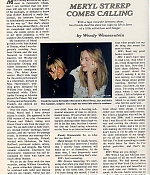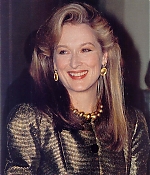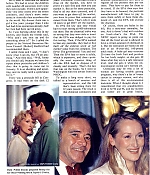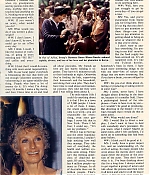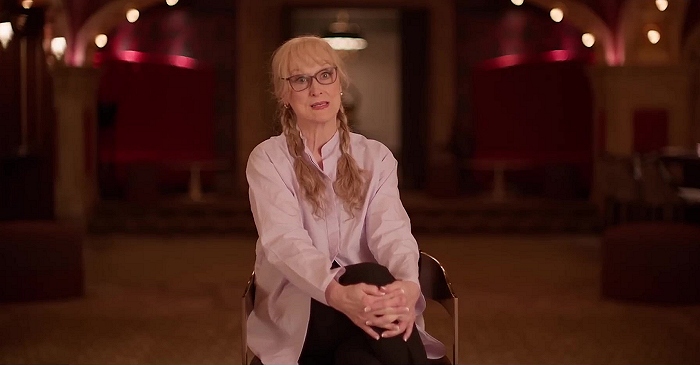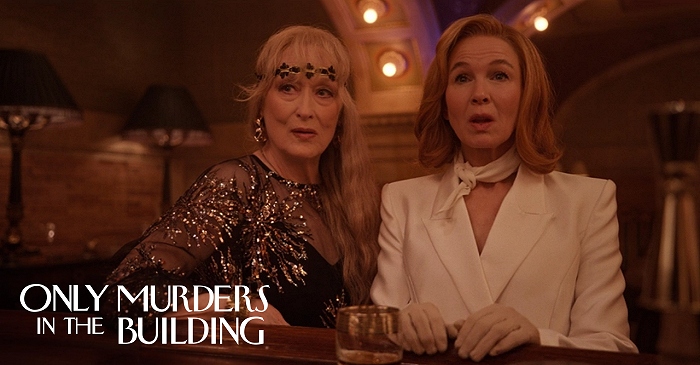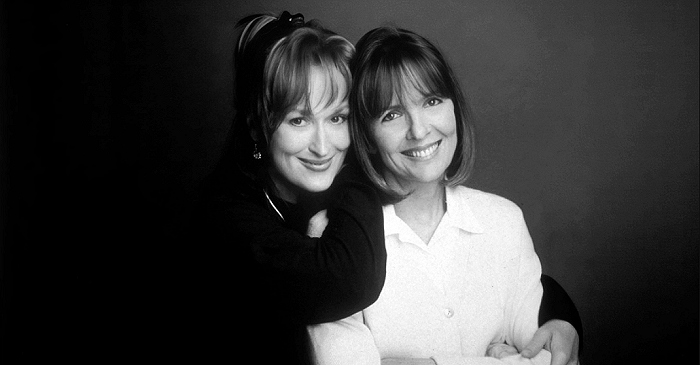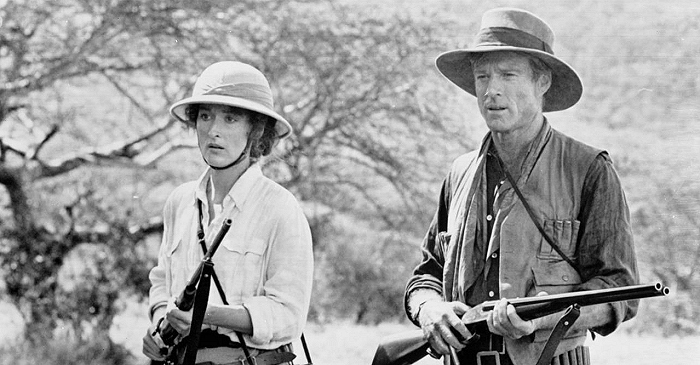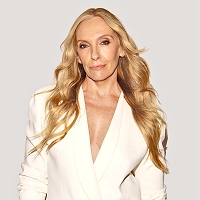|
Simply Streep is your premiere online resource on Meryl Streep's work on film, television and in the theatre - a career that has won her acclaim to be one of the world's greatest living actresses. Created in 1999, Simply Streep has built an extensive collection over the past 25 years to discover Miss Streep's body of work through thousands of photographs, articles and video clips. Enjoy your stay and check back soon.
|
|
Meryl Streep comes calling
The Saturday Evening Post ·
July 1989
· Written by Wendy Wasserstein
| ||

Meryl Streep arrives at my apartment in Greenwich Village, and I am terrified that my doorman will ask her to autograph one of his packages, or demand to know what Robert Redford is really like. Instead, the intercom buzzes and he nonchalantly announes, “Meryl’s on her way up.” But that’s always been the thing about Meryl – for such an exceptional and acclaimed actress, she comes across as a mother, a wife, and a friend. My memories of Meryl go back to the Yale School of Drama, when I was desperately avoiding Jacobean Drama and she was featured as Constance Garnett, the 90-year-old eminent translatrix in Christopher Durang’s and Albert Innaurato’s hilarious literary amalgamation, The Idiots Karamazov. Meryl took stage for the entire performance in a wheelchair, dressed in Miss Haversham’s wedding gown (designed by William Ivey Long), and translated while Christopher Durang as Alyosha played the Palace. She was riveting and unforgettable. Frankly, she cheered me up enormously.
Over the years, Meryl and I have always stayed in touch. She appeared in the PBS version of my play Uncommon Women and Others, taking over Glenn Close’s role from the stage version. We see each other at baby showers, mutual friends’ openings, ladies’ lunches, and the various life-passage events. In between our meetings, she’s been to africa, Australia, Poland, worked with Nicholson, De Niro, Redford, portrayed writers, artists, housewives and emigres. But Meryl remains consistent. Impressive but downhome. Glamourous but still intimidated by those who know too much about blusher. We sit on the floor with the tape recorder, eating William Greenberg, Jr. pecan schnecken (please, not to be confused with rolls) and playing with my cat, Ginger. Meryl has just completed A Cry in the Dark, in which she portrays an Australian woman falsely tried for murdering her own child. Now she is devoting substantial amounts of time to environmental issues. I am currently reworking a scene of a new play for what feels like the fifty-seventh time. We are afraid the interview will read like two old friends happily chatting rather than a high-viz life in the fast lane, but then I remember that my friend eating schnecken on the floor is an international draw.
WENDY WASSERSTEIN: So, so what do you think?
MERYL STREEP: To be totally honest, when I read most interviews I realize that I secretly hope someone will make an ass of themselves. At the same time, I very desperately want them to tell me something that is wise.
WW: And reassuring.
MS: Always reassuring. It’s interesting that when you read these pieces you can be very judgmental and very needy at the same time. Ever since I’ve been doing this myself, I find it painful to read other people’s interviews. At the same time, I’ll think, What a jerk. It makes me very nervous when people trot out the thing that means the most to them.
WW: Read any good books recently?
MS: I don’t have time to read a lot. And when I do, I read things that have just the facts. Now that I have these children, I’m just crazed about the world making it to the next century, so I read all these things about global warming, thermal inversions – you know, no nonsense. I’m trying to find a place where I can contribute. I felt so helpless at a certain point, and I talked to many people who felt the same way. I don’t want to have to think about these things. I would rather just retreat and make movies. But I have a daughter who will be 16 in the year 2000. And I remember what I was like at 16 – how incredibly vast and exciting the choices were. My parents, I think, had a lot to do with making me feel that way. I just don’t know if I’ll be able to impart the same enthusiasm to my daughter – to all my kids – unless I really feel that I’ve done something to make the world better for them. So I’ve picked pesticides, and that’s my thing.
WW: Excellent. What are you doing?
MS: Well, I was just wild this summer because of all the stuff that hit the beaches. We had moved three hours out of New York City to be in a place that was pure and beautiful so we could raise our children, so-to-speak, in the sun. And it turns out we really are. The low-level ozone, which is over all of Connecticut, is seriously hazardous to your health. We’d been in Australia six months before. We had to cover the children with number-26 sunscreen every time they went outside. There is now apparently very little ozone over the entire continent, and there’s more melanoma in Australia than anywhere else in the world. My dresser there was a girl a few years younger than I was who had three operations already; half her face had been carved away. So I was barking about this in my kitchen, and finally my friends said, “Why don’t you shut up and do something about it?” So I called the people at the Natural Resources Defense Council. [Robert] Redford had recommended them. All these environmental issues are considered very boring. They don’t capture anyone’s attention, because they’re just so long-term, really long and drawn out, not like an emergency Caesarean section, where we go get the baby out and everything is fine. You have to change your whole way of living. It’s like A.A. You have to clean up for the rest of your life. I called them and I said, “I don’t know what I can do, but I’ll do anything.” And they said, “Well, funny you should call, because we have this report about pesticides and children’s diets that is going to come out in January. It is so shocking and upsetting, and we really need a spokesman for it.” There was a pesticide bill in Congress last week. It’s been on the desk twelve years. You know, if you want to put a drug on the market, you have to prove it’s safe first and then you can market it. But as for these pesticides, they’re all out there untested, and if you want to get them off the market, you have to prove that someone got cancer from them. That’s why it took twelve years to get DDT off the market. In 1972, the law said they would have to start testing all 600 substances out there. But the chemical lobby was so strong that they were able to insert that the E.P.A. was obliged to pay for the testing. Then, if the E.P.A. wanted to ban any pesticide, they had to buy back all the existing stock at full market value from the Company. The E.P.A.! The government! You and me! Then the E.P.A. had to store it safely, which is expensive, and then – probably the most expensive thing of all – the E.P.A. had to dispose of it cleanly and properly. That’s the law that was on the books until last week. So I went to Washington with the lawyer from the N.D.R.C. She said, “We think this is important, but there are so many other things on the agenda in the last week of Congress. But for some reason there is bipartisan support now that might be able to get this through.” To make a long story short, we talked to a bunch of senators and representatives, and this bill that’s been sitting there for twelve years passed. The result is that chemical companies and pesticide manufacturers now have to register all the poisons that are out there. They have to pay for them to be tested. If the E.P.A. then says that they have to be banned, the pesticide manufacturers will have to pay to store them safely or have them disposed of, and the E.P.A. will oversee the disposal. Of course, there are holes in the bill, like a nine-year timetable, for one. And it doesn’t deal with residues on food, that’s the F.D.A. The N.D.R.C. report in January is going to point out that all the food we eat is allowed to have a certain amount of chemicals in it. But the tolerances are based on the diet of an 18-year old, 160-pound adult male. A baby girl may consume twenty times the fresh fruit and produce for her body weight, so she gets twenty times what they say is a safe tolerance level. And she gets it when her immunological system isn’t formed yet. Chemicals may be why a lot of women are having trouble getting pregnant, whey there’s a lot of breast cancer in younger women, and why there is all of this environmental leukemia. When I thought about it, I remembered that my grandmothers lived to be 94 and 96, and my mother and father are in great health, kinehara. And I realized that when my grandparents and parents were children, nothing they ever touched had anything on it. Nothing we or our kids eat is not tampered with. I pick up an apple and say to my kids, “Here, eat this. Don’t eat the potato chips.” And then I say, “No, eat the potato chips,” because the thing on the apples is systemic. You can’t wash it off, this thing called Daminozide is all through the fruit. And when it’s processed for juice or applesauce, it becomes something called UDMH, which is even more carcinogenic. I talked to all of my neighbors, and we have formed a little group to try to get organic food up where we live. It’s an old hippie joke, “organic” food, yet Texas and California have it because their consumers demand it, so that’s what I’m working on.
WW: Gee, organic food. I haven’t thought about that since 1969, but I’m impressed that you’re still out there.
MS: Well, I feel as if I have my hands on my future and my children’s future, which I didn’t feel before. I always feel that I’m alone, like Chicken Little. But everyone I talk to agrees it’s important. They just need to be motivated to believe that something can be done. I just think it’s hard to be the person who provides the food and takes out the garbage, because you also have to be the conscience of the family. And I think that’s still largely left to women. That’s why my little group is just women.
WW: The trouble with all this is that once you know about it, you can’t not know about it.
MS: Now I’m trying to screw up my courage to talk to the P.T.A. about this. It’s odd, I have this career that spans continents, but the pathetic thing is that I can’t get up in front of people and speak. I get really, really nervous.
WW: It’s because it’s you and not a persona.
MS: Yes. Fiction is something you can lie down and wrap yourself up in. In reality, you’re alone on the mountaintop in the wind and the storm, and you don’t know if you’re going to be blown away. In the movies, I know the ending. It’s the first thing I read.
WW: Since you’ve worked in all these other countries, do you think things are better elsewhere?
MS: No. I don’t know. I do feel the world has shrunk. When we were at Yale, I was interested in “Limits to Growth”, which came out in the ’70s. Living in different places, you come to realise that people are the same. Girls all want to be pretty; mothers love their children; guys want to have the biggest piece of pie, the power. But where it’s got out of control is here. Greed has made people ignore the environmental issues. Certainly nobody talked about them much during the Presidental campaign. We do whatever we want and whatever we don’t want to think about will just somehow go away. It’s the Scarlett O’Hara school of long-time planning. Of course, none of this means much to me, either, before my children were born.
WW: If you weren’t an actor, what would you do?
MS: What would you do if you weren’t a playwright?
WW: I don’t know. I don’t know if, by now, I could go to an office every day.
MS: I think I could. I like the routine of working, on going in every morning and “Hi! Hi!” and coffee and everything.
WW: And another family.
MS: Yeah. I liked it when I did it.
WW: I think I would do something with more social responsebility.
MS: In our local paper everyone is bemoaning the fact that there are not enough volunteers anymore. But volunteering is an upper-middle-class thing. People who have a lot of money do it. It’s what I’m doing; every eighteen months I make a big movie, and then I have time to sit and read all about pesticides. My friends up here are just barely holding it together. They have six and a half minutes to talk to their husbands at night. Otherwise they’re feeding the kids, supervising their homework and the household, and doing their own jobs. They don’t have time to read about environmental poisons; they told me they were glad I was telling them about it. When I got on an airplane in Hartford to go to Washington, I thought, You jerk, what are you doing? “Mrs. Gummer Goes to Washington”? My sister-in-law told me, “Just remember how mad you are.” It’s a great centering feeling. But it was very encouraging to learn how well informed the senators are. They just need to be reminded, like everyone else. It’s like the agent or the casting director who sees the eight-by-ten picture on his desk and says “This guy’s teriffic” because it’s on his desk. Congress had this bill, and in the last moment of the session we drew attention to it.
The only reason I felt I could do anything about it is that I live in a town of 5.000 people. I know a lot of them, I mean, the whole global-village idea is at work – you are responsible for everything, even your garbage. I never felt that in New York. There I felt free, I could say, “It’s not my problem”. When I was in Norway and the other Scandinavian countries, I couldn’t help noticing how well they manage. They take care of everybody; the health and welfare systems seem strong. There isn’t this teeming underclass of dead-end despair. Of course, Norway has 4 million people – as many as Chicago. In all of Australia there are 16 million people. That’s not very man more than in the New York metropolitan area. It’s no wonder one feels unable to do anything here.
WW: Well, here you just struggle to get by every day – if you can get a taxi.
MS: Yeah, and you’re exonerated from blame just for living here. Here it’s so bit that you don’t have to pay attention to these things – you just have to pay attention to getting ahead or being an artist or whatever else you’re doing. I don’t want to analyze everything I’m putting in my kids’ mouths. But the food supply has been screwed up. It’s all tampered with. It’s like the Tylenol bottles. Somebody’s been in there. I have much more interesting things to do with my time – lots of scripts and thing that are more interesting. But if you have a brain, you are obliged to use it. That’s why, in terms of scripts, I could never understand reviews of really loathsome movies that excuse the actors by saying, “They do the best they can with the dreadful material they have.” Why did they take the dreadful material? I’m talking about actors who are not struggling.
WW: Do you ever think about directing or producing or taking control in some way?
MS: I never, never have. I have thought about directing in the theater, because it’s a smaller field, I have a pathological hatred of the telephone – I hate to have it on my ear – so I wouldn’t be good at producing. But directing in the theater – I’ve always thought that I would do that at some point.
WW: Do you still think about it?
MS: Yeah, I do. It takes a lot of time, but it takes less time than acting in the theater. Maybe someday.
WW: What would you direct?
MS: I would like to direct a new play. I don’t want to deal with somebody else’s precedent. Dou you know what I mean? Maybe at some point, after I felt confident, I’d move on to something that had been done before.
WW: I think you’d be good at it.
MS: Well, first I’ll see how I do talking in front of the P.T.A. I really have a great respect for, and an understanding of, the craft of acting. So many people who write about the movies don’t understand either the process or the creation of the actor. They don’t know what it is. I’ve been thinking about this for a long time. I always wanted to get together a group of actors and talk about the process and then write it all down and send it to all the major critics so they’d know what it is that they are looking at. Most of them – even the most sophisticated – are swept away by whether it’s a character they like or dislike. They confuse the dancer with the dance. With my work, they get stuck in the auto mechanics of it – the most obvious stuff, like what’s under the hood. They mention the accent or the hair – as if it’s something I’ve laid on that doesn’t have anything to do with the character. It’s very ingenuous, really. They’re like children wo want to believe in Santa Claus. Some critics categorically refuse to belive Santa Claus is their dad with a beard. That it really is the person, that Jack Nicholson is like Jack Nicholson. The news is that most the great practitioners of the art of acting know exactly what they’re doing; even in the best, most successful moments, when they let go of the awareness of what they are doing, they still, somewhere deep inside their body, know what they’re doing. There is a craft.
WW: Has somebody written about the craft?
MS: David Mamet, I guess, wrote a book, but I haven’t read it, of course. You know, when actors get Oscar nominations, they just kvell over the fact that they got nominated. That’s because actors vote for the acting nominees; the general membership votes for the winners. So winning may not be considered as informed an honor as a nomination. I don’t think people really understand that. There’s a lot of smirking when an actor makes that statement, but it’s the truth. Other actors do know what good acting is, just as writers know what good writing is. Acting has to reach everybody on some level – it’s a communication of feeling – but as far as judging the work is concerned, it is, I think, something that actors know about. I was trying to figure out what, as an actor, I’d do, because I’m not an analytical person. It’s the opposite of the way I am when I cook. I’m somebody who’s prepared meals for twenty years, pretty much the same stuff, and every time I have to trudge over “The Joy of Cooking” for everything I should have memorized. Of course, I remember the descriptions: “Our best devil’s food cake”; “We once saw this recipe feed 100 wedding guests – it took thirty eggs!” But I can’t for the life of me remember how to make it. I really envy people who can say, “What’s in the fridge?” and just put those elements together and concoct a feast. But that is how I act; I just see what’s there in me that I can apply to the task at hand and instincually apply those elements. And I know the things that trigger good work, and I know that most of it happens on the set, on the stage, “in the moment”, as we used to say in acting class.
WW: When it’s triggered by the director and the circumstance.
MS: Yeah, and I have a sense of shaping things, of where I want something to blossom and where I want it to be held in until then, where not to blow it all out until this point. That’s stuff that people who are just watching don’t want to know about. They want to believe in the character. They don’t want to see the geisha flossing, you know; they want to see her smile. Every actor I’ve ever met knows about the process and talks about it. So you would think the people who judge actors would at least familiarize themselves with the art form and its process. But you rarely if ever see it written about in reviews, in critiques, in specific language. Most critics stand in awe of that process. They’re afraid of it, and they don’t want to get into it and sound foolish.
WW: Or they’ll think it was the director or the writer.
MS: They can come closer to understanding those disciplines. Or they’ll give credit for the wrong thing—God knows I’ll take it however it comes—like the easiest moment in the film for the actor, because all you have to do is appear. Say you’re supposed to have been dead for 15 years and you come around the corner and the music swells, and they write, “The moment when she came around the corner—she wasn’t dead! And the look on her face…” Well, if she’s beautiful and back-lit, all she has to do is think about lunch and the shot will work.
WW: Do actors talk to each other about acting?
MS: Yes, of course. I remember in the old days after work we used to go to those places in the theater district like Joe Allen and Jimmy Ray’s and swig beer and pontificate.
WW: That was when you were with the Phoenix Theatre Company.
MS: Yeah. All that can get tedious, but there’s a lot to talk about there, and I’ve really been thinking lately about setting it down. Another act of public service!
WW: You know, it was interesting reading that horrible Kazan book. It was gossipy and awful, but there were ideas in there—there was this whole world. I thought, “Now when we read about those actors it’s whose boyfriend is whose, and yet there is a craft and those people think about it in a serious way. It would be interesting to read about it.”
MS: Yes. When I get pesticide-free food into the market, then I’ll move on to art. We have to take care of business in our prose life before we move into the realm of the poets. My prose life is definitely taking over at this point.
WW: Well, the thing about acting is that it’s all mysterious, too. I know, as a writer, that the director always says, “Don’t talk to the actors.”
MS: Don’t feed the animals.
WW: And so now I don’t talk to the actors because there’s this whole mysterious thing going on.
MS: Yes, there is definitely a mystery, the unknowable part that makes good actors go and watch one another in the hopes of glimsping that and for the inspiration of it. And they say to each other, “I just don’t know how you did that.” But underneath that—the safety net underneath that high-wire act—you know there is a structure there that you can know about. And the rest is just magic. Which is, I’m sure, true in writing as well.
WW: Yes, it’s the same thing.
MS: When you write a piece, is there a part that you just put aside as the problem scene?
WW: Yes…
MS: You say, “I’m not going to think about that. The rest is all so successful, the actors love this, the director loves this, this works. The other part is the problem. If we could just leap over that and minimize it…” Then do you ever find, after everybody has driven themselves excruciatingly to solve that one piece, that it becomes the thing that defines the whole?
WW: Yeah, all the time. In the play I’m doing now, there’s one scene that I’ve written 20 times and it’s still not solved. It drives me crazy, but I know it can unlock something. And then everything else will be solved.
MS: Well, that was true for me in Out of Africa. I thought it was a great script, but there was this one line that I thought was just preposterous, and I didn’t know how I was going to get it out. I didn’t want to say it. I didn’t mind being proprietary about “my” Africans, or Karen Blixen’s other sort of grande-dame pretensions; but when Dennis suggests taking their young friend along on one of his flights and she rises up from her chair and syas, “I won’t allow it, Dennis,” I though it sounded like a mother admonishing her child, which did not reflect their relationship at all. It felt like a little vehicle, like a car that he could get into and slam the door and peel out in. Without that line, did he have enough reason to storm out of her life in a big huff? I though this was a really good argument. When we came to do the scene, I said, “All right, you know, I’m a good sport, I’ll say it, and I’ll try to make it work, but it won’t.” And, of course, when we played it, it was the easiest and freest thing she said in the scene, because all the reason had been used up; there was nothing left to argue with but her desperation, and it was so preposterous and pathetic that it was right. It was a key to the woman. I hate it when they’re right.
WW: Tell me about your new film, A Cry in the Dark.
MS: Well, I told Fred [Schepisi] I don’t know how much people who want a light piece of entertainment are going to be drawn to this. It certainly plays on deep emotional fears. One woman journalist told me yesterday she found it more disturbing than Nightmare on Elm Street. She said it upset her more than anything else she’d seen, except for maybe Shoah. It has a deep emotional power, but it’s also got a lot of things to think about. I said to Fred that if they gave points on degree of difficulty for the Oscars, as they do in the Olympics, he’d sweep ’em, because for him this was an incredibly complicated shoot.
WW: And script.
MS: Yeah. He co-wrote the script, and everything in it was subject to litigation. While we were making this film Lindy Chamberlain—that’s my character—and her husband were convicted murderers. They’d been pardoned, but the convictions stood. She is still the most notorious woman in Australian history. She was fighting for a change in the law that would make it possible for her to be exonerated, to have everyone in Australia say “I’m sorry,” and to get some compensation, because a pardoned murderer can’t sue for damages. Lindy Chamberlain was a consultant on the film and had script approval, so in her court case they could say to her, “Welll, you testified that you were seven or eight yards from the tent,” but in the film you had to have her 20 feet away or something like that. If we weren’t absolutely accurate, we could have screwed up her chance to be cleared once and for all in the courts.
WW: It’s different from having the studio accountants hanging over your shoulder.
MS: We had the studio accountants and the heavy hand of the law and the press looking at what we were doing.
WW: Anyway, it doesn’t matter now, because she’s won.
MS: Yeah. They changed the law, and she’s free and clear. Her life is wrecked, but now at least she can get a passport, and her papers don’t say “FELON” on them.
WW: She can do the publicity tour. Shall we move on to the subject of weight?
MS: Surprisingly, it was very easy for me to gain the weight for this role. I’m kidding, but the idea of how she looked, scowled on TV, the weight during the pregnancy, you know, the eyebrows…
WW: The eyebrows are great.
MS: They go straight up like…
WW: A she-demon’s.
MS: All the things about how this woman appeared on camera in small bytes through this whole ordeal made people judge her guilty before she ever set foot in a courtroom. I wanted to get that.
WW: Do people say to you, “You look much prettier in person than you do in the movies?”
MS: Yes, but it’s probably better than, “God, you look so much better in the movies that you do in real life.”
WW: I should ask you why you keep doing what you’re doing, because it’s very difficult and insecure.
MS: Yeah, it’s usually over in four months.
WW: But then you’ve got something “in the can.”
MS: Your life’s work consists of this unrelated series of combustions. It’s ticking, ticking, and then one day in November it makes a big noise and a light in the sky and then…
WW: Is this a bomb we’re talking about?
MS: Shut up.
WW: I was thinking about how most of the people we went to drama school with—a lot of them—are doing what they wanted to do with their lives, even if it’s awful and difficult.
MS: But I’m doing the only thing I can, I think.


Posted on October 18th, 2025
|
Posted on October 14th, 2025
|
Posted on October 11th, 2025
|
Posted on September 30th, 2025
|
Posted on September 16th, 2025
|




